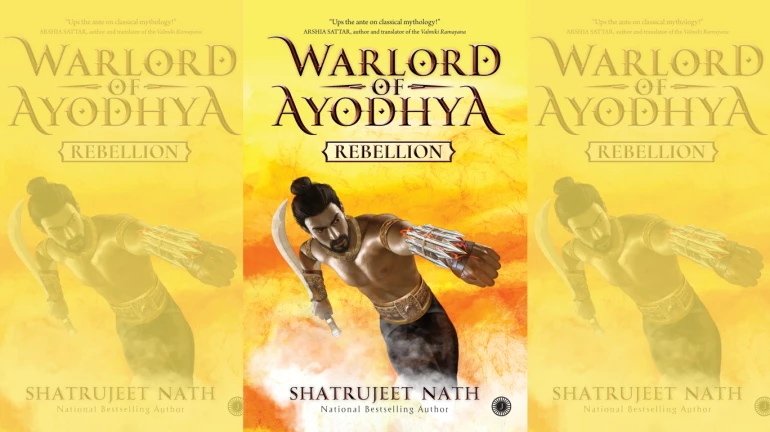
Recognised as "A new face to Indian mythology”, Shatrujeet Nath, has written the runaway national bestseller series Vikramaditya Veergatha. He also writes movies and web shows.
His recent book Warlord of Ayodhya is a spinoff of the Ramayana, that tells the story of Bharat’s 14 year rule over Ayodhya during the exile of Lord Rama.
Here are the excerpts from an exclusive conversation with Mumbai Live:
Your first book, The Karachi Deception, was a spy thriller. From writing a thriller to now mythology, what made you switch genres?
I do not look at genres while deciding what to write. The only thing that matters to me is that the story must be appealing. The plot and the possibilities it presents should excite me. When I sat down to write The Karachi Deception, the idea of three Indian commandos deep inside Pakistan being betrayed and finding themselves at the mercy of the ISI made a compelling story. What excited me about the Vikramaditya Veergatha series was the fact that the devas, the asuras and the humans are caught in a struggle to control the Halahala, the most powerful weapon in the universe. Now with Warlord of Ayodhya, the idea of telling the story of an important but overlooked character from the Ramayana fascinates me. It has helped that I am a fan of spy fiction and epic fantasy, but ultimately, one has to pick stories, not genres.
What is the main objective behind writing mythological stories?
Mythology is one of the oldest forms of storytelling that exists in the world. Every myth and legend in every culture dates back thousands of years, and has been handed down to us as a part of our collective heritage. What is remarkable is that not only has mythology survived the test of time, in many instances, it has actually grown stronger and more vibrant with age and successive retellings. That is a measure of how powerful mythology is, and this is what I find attractive about mythology. And Indian mythology is incredibly rich in subject material. There are so many stories we can mine from Indian mythology, so many characters we can build our stories on.
Having said that, mythology and mythological characters are only a backdrop to my stories, which are completely original in their construct. My stories are plotted and written with an eye on contemporary tastes and sensibilities, and the audience for my books go beyond readers who favour mythology. So, for instance, my Vikramaditya Veergatha series (which consists of four books) is about a three-cornered war between the devas, the asuras and the humans for the control of a devastating weapon. The series draws from mythology and has characters like Lord Shiva, Vikramaditya, Indra and Shukracharya, but the books read like modern thrillers and are packed with action, drama and suspense. Similarly, my latest book, Warlord of Ayodhya: Rebellion, draws from the Ramayana, but is written like a political thriller. What excited me about the Ramayana was seeing how there was an opportunity to tell the story of Bharat and his 14-year rule over Ayodhya when Rama was in exile.
The core idea of my Warlord of Ayodhya and this show is the same: someone who isn’t trained to rule is suddenly left with the responsibility of ruling a kingdom / country. How they grow and adapt to that challenge, what obstacles they face and overcome… that is the common ground, the human story. I chose Bharat because he is familiar to us, and we can understand his predicament. I draw from mythology, but pace my stories like thrillers.
Do you believe that the essence of mythology is diminishing among today's youth?
I don’t think the essence of mythology is diminishing among today’s youth. If that were the case, people like Amish, Anand Neelakantan, Kavita Kane or I would not be in business, and a hundred mythological TV shows would not be airing on satellite channels simultaneously.
Yes, the appeal of mythological stories told in the traditional way is diminishing – because people’s tastes and sensibilities have changed. Today’s youngsters are exposed to cutting-edge storytelling from all over the world, and they have little patience for old style storytelling. However, the stories themselves still retain their appeal. That is why people buy and read books written by Amish, Anand, Kavita and me – we tell mythological stories, but in contemporary voices. Mythology has been relevant for thousands of years and will stay relevant for thousands more as long as the storytelling techniques keep evolving with time.
What is next on the platter for your readers?
I have just started writing Resurrection, the second book in the Warlord of Ayodhya series, which takes the story of Bharat and Ayodhya forward. That will be followed by the third and final book of the series. Once I am done with Bharat’s story, I hope to write a dark, psychological thriller that has been brewing in my mind for a long time. I also want to write a couple of historical fiction novels from Indian history. There is also a crime series I have in mind which of these will happen first is very hard to say at this stage.
Any tips or suggestions for aspiring writers?
I think it is important for all aspiring writers to remember that the difference between wanting to write and having written is one year of hard, relentless labour. It is a bridge you have to build all by yourself, all alone, all through the night, while the world goes about its business without giving a damn. The only way of making this perilous passage is by looking at it as a pilgrimage.





